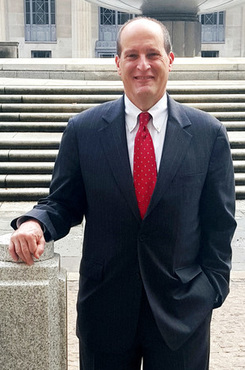Big Law Billed Republicans Millions to Sue Obama. Against Trump, Firms Are Working for Free
House Republicans struggled to find lawyers willing to work on their challenges to the Obama administration due to the unpopularity of the stances.
August 22, 2019 at 03:00 PM
6 minute read
 Former U.S. Solicitor General Donald Verrilli Jr. in his office at the U.S. Department of Justice in June. Credit: Diego M. Radzinschi/ ALM
Former U.S. Solicitor General Donald Verrilli Jr. in his office at the U.S. Department of Justice in June. Credit: Diego M. Radzinschi/ ALM
House general counsel Douglas Letter is getting a boost from Big Law in his legal fights with the Trump administration—all for free.
The private law firms tapped to help the House handle its unprecedented caseload—Munger, Tolles & Olson, Hogan Lovells and Sidley Austin—have pro bono arrangements, lawyers familiar with the deals and a spokesperson for Democratic Speaker Nancy Pelosi confirmed.
Georgetown Law's Institute for Constitutional Advocacy and Protection, which offers free legal services for all of its clients, has done the same for the three House lawsuits it's involved in, ICAP executive director Joshua Geltzer said.
The House has turned to outside counsel in the past, but the free help being offered now stands in contrast to the steep legal bills outside attorneys racked up under Republican Speaker John Boehner in his lawsuits against the Obama administration.
Kerry Kircher, House general counsel from 2011 to 2016, said he wasn't able to get the kind of free representation Letter is accessing because the Republican lawsuits were unpopular among D.C. law firms.
"It wasn't like I could have gotten top-notch representation on a pro bono basis to do that," Kircher said.
During the Obama administration, the GOP-controlled House turned to private lawyers, first David Rivkin with Baker & Hostetler and then Quinn Emanuel Urquhart & Sullivan's William Burck, to lead their suit against the Affordable Care Act. Rivkin was reportedly paid $500 an hour, according to an ABA Journal report.
But Rivkin dropped out of the case, reportedly over concerns that the unpopular position could hurt his firm, and Burck also backed out. George Washington University law professor Jonathan Turley was eventually hired for the lawsuit.
Turley received $500 an hour for his work on the suit, and was authorized to receive up to $350,000, according to a Democratic letter discussing the terms of his 2014 House contract.
Paul Clement, initially with King & Spalding, left the practice and joined Bancroft in 2011 to work on the House lawsuit defending the Defense of Marriage Act in federal court, after the Obama Justice Department decided to stop protecting the law from legal challenges.
King & Spalding first backed Clement's work but later pulled its support from the suit, saying the "process used for vetting this engagement was inadequate." Clement is now a partner at Kirkland & Ellis.
Rivkin, Burck and Clement did not respond to requests for comment.
A contract obtained by ThinkProgress in 2011 shows that Clement, a former solicitor general, was paid $520 an hour for his work. The House initially set aside $500,000 for that litigation in 2011, but bumped it up to $3 million in 2013.
Kircher said that lawyers in D.C. are now "aroused" by the legal battles between lawmakers and the Trump administration, and are eager to get involved in the cases, even if it means they aren't getting paid for it.
"I'm not at all surprised he's turned to outside assistance," Kircher said of Letter. "I'm happy for him he's able to find it, I think he's gotten very good pro bono assistance."
Thomas Hungar, House general counsel from 2016 until Letter was brought on this year, said the kinds of legal cases on the House's docket are intriguing to private attorneys.
"A lot of times in kind of high-profiles cases like these against the government, people are willing to do it pro bono for a combination of reasons," Hungar said. "For ideological reasons, the opportunity to litigate a fun, exciting, cutting-edge case that's going to have a lot of public attention."
Under House ethics rules, lawmakers can accept free legal help for civil cases challenging the validity of federal rules and regulations, or federal officials or agencies' actions, given that it's not a private issue. The House also passed a resolution in June that authorized Letter to use external lawyers in court cases to enforce subpoenas.
 Doug Letter.
Doug Letter.While Letter still leads arguments in the courtroom, he's taken advantage of the outside counsel. ICAP helped his office in the legal fight over the census citizenship question, as well as seeking to defend a female genital mutilation ban that the DOJ stopped defending in the U.S. Court of Appeals for the Sixth Circuit.
The Georgetown Law institute teamed up with the House again in the lawsuit to compel testimony from former White House counsel Don McGahn, whose testimony Democrats believe will play a key role in making the decision on whether to formally start impeachment proceedings.
Several of the attorneys signing on to help for free have extensive experience in the areas being litigated. Former Solicitor General Don Verrilli, who successfully defended Obamacare before the Supreme Court in 2012, is now helping defend the law again in the U.S. Court of Appeals for the Fifth Circuit.
Three Sidley Austin attorneys—former DOJ lawyers Virginia Seitz and Joe Guerra, as well as U.S. Supreme Court veteran appellate lawyer Carter Phillips—have expertise in constitutional separation of powers issues. They are now pitching in on the House's appeal of its suit to block the Trump administration from diverting military funds for a border wall.
And former acting solicitor general and Hogan Lovells partner Neal Katyal said he's also helped with the census and female genital mutilation cases pro bono. While it didn't involve the House, Katyal also worked pro bono on litigation opposing the Trump administration's travel ban for individuals from several majority-Muslim countries.
"There's a whole range of stuff that Republican administrations engage in all the time, and you don't see the law firms challenging it," Katyal said. "But what's going on here, like the census case, is so beyond the pale. That's why you're seeing lawyers stand up and do this."
Read more:
Sidley Austin Presses US House's Legal Arguments in Trump's Border Wall Fight
Verrilli Gets US House Call to Defend Obamacare
'These Arguments Are Fabricated': House's Doug Letter Rips DOJ Brief Backing Trump
Neal Katyal Wants to Train Next Generation of Supreme Court Advocates
This content has been archived. It is available through our partners, LexisNexis® and Bloomberg Law.
To view this content, please continue to their sites.
Not a Lexis Subscriber?
Subscribe Now
Not a Bloomberg Law Subscriber?
Subscribe Now
NOT FOR REPRINT
© 2025 ALM Global, LLC, All Rights Reserved. Request academic re-use from www.copyright.com. All other uses, submit a request to [email protected]. For more information visit Asset & Logo Licensing.
You Might Like
View All
Trump Administration Faces Legal Challenge Over EO Impacting Federal Workers
3 minute read
US Judge Cannon Blocks DOJ From Releasing Final Report in Trump Documents Probe
3 minute read
Private Equity Giant KKR Refiles SDNY Countersuit in DOJ Premerger Filing Row
3 minute readTrending Stories
- 1The Gold Standard: Remembering Judge Jeffrey Alker Meyer
- 2NJ Supreme Court Clarifies Affidavit of Merit Requirement for Doctor With Dual Specialties
- 3Whether to Choose State or Federal Court in a Case Involving a Franchise?
- 4Am Law 200 Firms Announce Wave of D.C. Hires in White-Collar, Antitrust, Litigation Practices
- 5K&L Gates Files String of Suits Against Electronics Manufacturer's Competitors, Brightness Misrepresentations
Who Got The Work
J. Brugh Lower of Gibbons has entered an appearance for industrial equipment supplier Devco Corporation in a pending trademark infringement lawsuit. The suit, accusing the defendant of selling knock-off Graco products, was filed Dec. 18 in New Jersey District Court by Rivkin Radler on behalf of Graco Inc. and Graco Minnesota. The case, assigned to U.S. District Judge Zahid N. Quraishi, is 3:24-cv-11294, Graco Inc. et al v. Devco Corporation.
Who Got The Work
Rebecca Maller-Stein and Kent A. Yalowitz of Arnold & Porter Kaye Scholer have entered their appearances for Hanaco Venture Capital and its executives, Lior Prosor and David Frankel, in a pending securities lawsuit. The action, filed on Dec. 24 in New York Southern District Court by Zell, Aron & Co. on behalf of Goldeneye Advisors, accuses the defendants of negligently and fraudulently managing the plaintiff's $1 million investment. The case, assigned to U.S. District Judge Vernon S. Broderick, is 1:24-cv-09918, Goldeneye Advisors, LLC v. Hanaco Venture Capital, Ltd. et al.
Who Got The Work
Attorneys from A&O Shearman has stepped in as defense counsel for Toronto-Dominion Bank and other defendants in a pending securities class action. The suit, filed Dec. 11 in New York Southern District Court by Bleichmar Fonti & Auld, accuses the defendants of concealing the bank's 'pervasive' deficiencies in regards to its compliance with the Bank Secrecy Act and the quality of its anti-money laundering controls. The case, assigned to U.S. District Judge Arun Subramanian, is 1:24-cv-09445, Gonzalez v. The Toronto-Dominion Bank et al.
Who Got The Work
Crown Castle International, a Pennsylvania company providing shared communications infrastructure, has turned to Luke D. Wolf of Gordon Rees Scully Mansukhani to fend off a pending breach-of-contract lawsuit. The court action, filed Nov. 25 in Michigan Eastern District Court by Hooper Hathaway PC on behalf of The Town Residences LLC, accuses Crown Castle of failing to transfer approximately $30,000 in utility payments from T-Mobile in breach of a roof-top lease and assignment agreement. The case, assigned to U.S. District Judge Susan K. Declercq, is 2:24-cv-13131, The Town Residences LLC v. T-Mobile US, Inc. et al.
Who Got The Work
Wilfred P. Coronato and Daniel M. Schwartz of McCarter & English have stepped in as defense counsel to Electrolux Home Products Inc. in a pending product liability lawsuit. The court action, filed Nov. 26 in New York Eastern District Court by Poulos Lopiccolo PC and Nagel Rice LLP on behalf of David Stern, alleges that the defendant's refrigerators’ drawers and shelving repeatedly break and fall apart within months after purchase. The case, assigned to U.S. District Judge Joan M. Azrack, is 2:24-cv-08204, Stern v. Electrolux Home Products, Inc.
Featured Firms
Law Offices of Gary Martin Hays & Associates, P.C.
(470) 294-1674
Law Offices of Mark E. Salomone
(857) 444-6468
Smith & Hassler
(713) 739-1250











